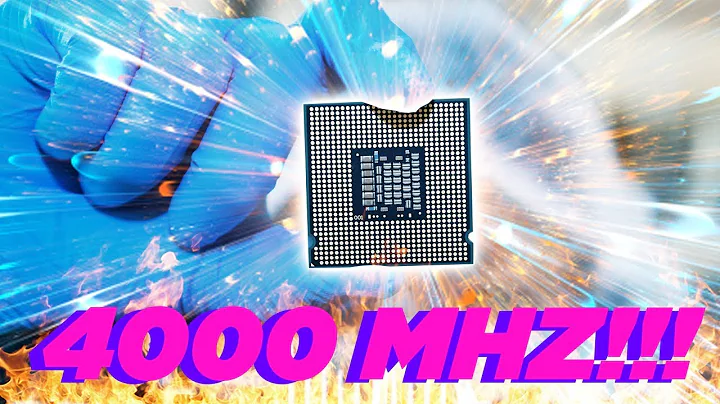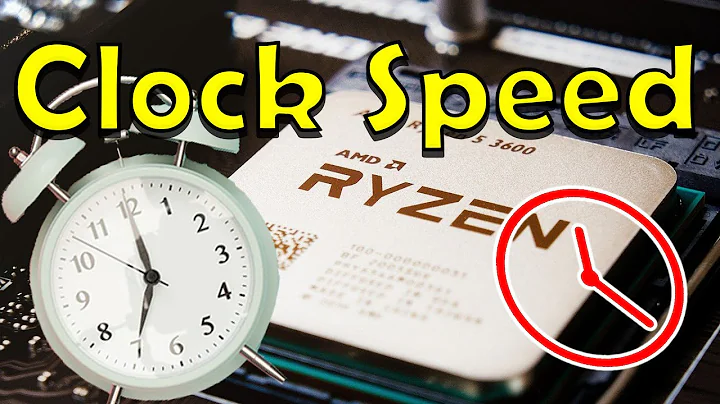CPU and Motherboard clock speeds
CPU clock speed = cpu multiplier x mobo clock speed.
This one is a bit vague since there is not one clock speed on the motherboard. There are several. E.g. the PCI bus runs at 66MHz or 33MHz. PCIe runs at several speeds. Ram IO at several speeds. Most of the time these are derived or synchronised to one base clock.
When people used to talk about bus speed on the motherboard they usually meant a clock which was used to talk to the CPU's FrontSideBus.
E.g. A Klamath CPU (pentium 2) would run at 233Mhz.
What you call 'motherboard clock' would be 66MHz.
- CPU would run at 3½ times that speed
- The PCI bus would run at half that speed.
- The AGP bus would run at that speed
- Memory IO was often tied to this speed.
Back then increasing that clock yielded performance gains in all four items. If one of them could not keep up the system would not work.
Since then things have changed. The design is much more modular.
If the CPU clock speed is dependent upon the mobo clock speed, then how is the clock speed of the CPU predetermined upon buying the CPU (i.e. written on the box without knowing what mobo is being used)?
It is determine by testing how fast a CPU can work reliably. And then labeling it as such.
E.g. I produce a 1000 pentium-1's chips and and test them I may find that:
- Some of them are broken. I discard these.
- Some of them will work fine at 133MHz, some will fail at 133MHz. Those which work get binned as 133MHz CPU's
- I retest the remaining CPUs as 120MHz. Those which work I 'throw' in a bin marked 120.
- Repeat for lower speeds.
If I need more CPUs marked -120 and I got a surplus from the 133 bin then some get moved.
The key point however is that the CPU has no speed of its own. It is tested and guaranteed to work with a specific multiplier and a specific bus speed. It may work if these are exceeded. It may not. And if you set these values lower it will simply run slower.
Back in ye old days the person buying the CPU had to jumper the motherboard correctly.
E.g. for a pentium 1 120MHz you would jumper the motherboards main clock for 60MHz, set the jumpers for a x2 multiplier, and select the right voltage. On boot the CPU would read the multiplier and act accordingly.
If you made an error (e.g. by setting the jumper to indicate a 1½ multiplier) then it would simply run at a different speed. If it was slower then that was no problem. If it was faster then it might not work at all (but sometimes you got lucky).
Some people tried to maximise performance of their CPU by doing their own testing. Often you could gain some speed by playing with bus speed, multiplier and voltages. Equally often people pushed their CPU too far and it ran unstable.
This is not a problem. As an overclocker you know what you are doing.
However some shops also relabeled chips and sold their CPU as rater for a higher speed. I think this was the main reason why Intel started locking their multiplier maximum.
After installation, does the CPU adjust it's multiplier based upon the mobo clock speed to achieve advertised speeds?
No, most of the time the CPU is configured for one specific multiplier.
The speed it is sold as it expected base clock time that multiplier. (You can often lower the multiplier though. This results in a lower speed but also in lower power usage).
For example, if the CPU clocks speed is advertised at 2.4GHz and the mobo clock speed is 100MHz, will the multiplier be automatically set to 24x?
No. It will start at 24. Either because it is locked at 24x, or because it reads you BIOS and finds that that auto configured itself for a 24 multiplier.
If you try to set a higher multiplier then the CPU will mostly ignore that.
(Exception: unlocked CPU's which as sold as black editions.)
Why does mobo clock speed seem to not be very important / talked about? For example, when I search on Newegg, mobo clock speed never seems to be listed. When I search enthusiast forums and overclocking forums, mobo clock speed is rarely mentioned. To me, it seems like the mobo clock speed would be pretty important.
Speeds on the motherboards are important. They are also more or less the same for all same generation boards.
If I am understanding things correctly, a lower mobo clock speed means that you CPU must work harder to achieve advertised clock speeds.
No, it would not archive the same speed. It would just run slower.
Related videos on Youtube
NZHammer
Updated on September 18, 2022Comments
-
NZHammer almost 2 years
I have been doing some reading about CPU clock speeds and how CPU clock speeds are calculated. After reading several articles, I have come to the understanding that your CPU clock speed is determined by:
CPU clock speed = cpu multiplier x mobo clock speed
A few questions came about after reading this which I cannot seem to find the answer to anywhere:
If the CPU clock speed is dependent upon the mobo clock speed, then how is the clock speed of the CPU predetermined upon buying the CPU (i.e. written on the box without knowing what mobo is being used)? After installation, does the CPU adjust it's multiplier based upon the mobo clock speed to achieve advertised speeds? For example, if the CPU clocks speed is advertised at 2.4GHz and the mobo clock speed is 100MHz, will the multiplier be automatically set to 24x?
Why does mobo clock speed seem to not be very important / talked about? For example, when I search on Newegg, mobo clock speed never seems to be listed. When I search enthusiast forums and overclocking forums, mobo clock speed is rarely mentioned. To me, it seems like the mobo clock speed would be pretty important. If I am understanding things correctly, a lower mobo clock speed means that you CPU must work harder to achieve advertised clock speeds.
I guess that I should stop there with the questions for now, as I may be asking my questions based on incorrect assumptions.
Thanks!
-
Supercereal over 11 yearsMobo clock speed (front side bus) is dynamic and set by the bios when it detects the CPU for the first time. The CPU has a hardware Identifier that it passes the BIOS/EFI. This why you may see processor support tied to bios version. For example on the linked ASUS site you see a "since bios" which is when the hardware ID was added to bios. asus.com/Motherboards/AMD_AM3Plus/M5A97/#CPUS
-
 Ƭᴇcʜιᴇ007 over 11 years
Ƭᴇcʜιᴇ007 over 11 years -
Reinderien over 5 years@Ƭᴇcʜιᴇ007 Easy explanation is a broken link.
-
 InAFlash about 3 years
InAFlash about 3 years
-
NZHammer over 11 yearsGreat. Thanks for the well-thought-out response.

![CPU clock speed not stable? Try this! | Setting TPL with ThrottleStop. WITH COMPARISON [i5-10210u]](https://i.ytimg.com/vi/S8Q0zYpIpGI/hq720.jpg?sqp=-oaymwEcCNAFEJQDSFXyq4qpAw4IARUAAIhCGAFwAcABBg==&rs=AOn4CLCS5B-fLkDEArs8c6k5_oI5En4upw)


